Samantha Combs's Blog, page 3
November 27, 2013
Meet Author Patricia Kiyono
While I have a truckload of friends and fellow author colleagues from Facebook, I have only a handful I have met IRL. (In real life). My friend Patricia Kiyono is one of them. She traveled with her daughter to my sunny neck of the woods and we got a spare afternoon to meet, lunch, and talk books, both reading and writing. She has a new release perfect for the holiday season and I am happy to host her, and the new book, here on the bloggy. Read about how she got the idea for the new story! See, everything you know holds a possible new idea....Patricia proves it.
Post by PATRICIA KIYONO
I've always been fascinated by cultural references. I think they make up the essence of a town. While in most areas of the United States the population is a mixture of many cultures, there are some pockets of a concentration of one ethnic group.
 In southwest Michigan, the city of Holland is recognized as a miniature tribute to the Netherlands, the nation to which many of its inhabitants can trace their ancestry. There are several Dutch language churches, and the city hosts the Holland Tulip Festival each May. The streets are swept clean during the Kinderparade, and groups of dancers perform in their klompen, or wooden shoes.
In southwest Michigan, the city of Holland is recognized as a miniature tribute to the Netherlands, the nation to which many of its inhabitants can trace their ancestry. There are several Dutch language churches, and the city hosts the Holland Tulip Festival each May. The streets are swept clean during the Kinderparade, and groups of dancers perform in their klompen, or wooden shoes.
While the cities of Holland and nearby Grand Rapids are typically urban, the villages between them are quaint and picturesque. The Dutch heritage is evident here as well, as several schools, churches, and towns boast names reminiscent of the Old Country - Drenthe, Zeeland, Vriesland, and Borculo are some of the burgs named for people and places in the Netherlands. The telephone book is full of names beginning with the prefixes Van (meaning from), Vander (from the) and De (the). This is where I grew up, and where I still live today.
Of course, my family is Asian, so we always stood out among the tall, fair, blue eyed population. But this community stood up and protected my father and his family during the World War II, when thousands of Japanese families were shipped off to internment camps and lost everything they had. But here in Grand Rapids, Michigan, church officials and civic leaders petitioned the federal government and somehow assured the powers that be that this little family posed absolutely no threat to national security, and that it was not necessary to take them away. Still, Dad remembers being hauled out of school and taken to the federal building and fingerprinted – just in case. Black limousines followed him and his brother whenever they went out with their friends. But thanks to the good people of Grand Rapids, they were able to keep their home. We owe this Dutch community a lot.
It is this type of community that I tried to depict in Christmas Wishes, my newest release. It's about the sense of belonging, and about making wishes come true. Here's a little bit about the book.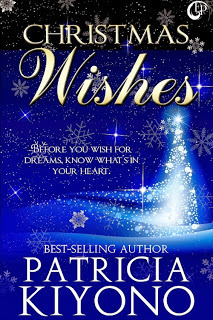
Blurb:Photographer Mitch Carson is tired of big city life. He just wants to settle down in a quiet town with his daughter, Angie. Even that doesn't quell his fear of losing his daughter to his scheming mother-in-law.Sophie Gardner wants to be a screenwriter. She's ready to leave small town Zutphen, Michigan and go to Hollywood. With a theater degree under her belt, she's busy writing scripts while helping out her sister Joanie, who's bedridden with a difficult pregnancy. Unfortunately, Joanie has somehow coerced Sophie into directing the Christmas pageant at Zutphen Community Church. When Sophie and Mitch meet, the attraction is instant and mutual. But each wants what the other is trying to get away from. Can they deny their feelings and pursue their dreams? Or will the holiday prove to them that their true wishes might not be what they'd thought?
Excerpt:Mitch tightened the knot on his tie. The action seemed symbolic of tightening a noose around his own throat. He had never thought he’d be going to another church service. Sending his daughter to Sunday School with the VandenBerg family was one thing, but attending a service with her was quite another. But for his little girl, he’d do almost anything, and she wanted to go to the Big Church with him on Sunday, so he’d agreed to go.Angie sat on his bed, dressed in a new outfit his mother had helped her pick out. Her hair was neatly combed, though he noticed the curls were somewhat uneven. She opened and closed her little purse to make sure she had everything she needed. He wasn’t sure what a six-year-old would need for a church service, but he knew her two grandmas would have instructed her.“Are you almost ready, Daddy?” she asked. “Jennie says it starts at nine o’clock.”“I’m almost ready, sweetheart, and we’re not going to be late. The church is only ten minutes away.”“Sunday School is after church. There’s four other girls from my class at school. And there’s no boys, so it’s more fun.”Mitch held in his laughter. Her views on boys would change soon enough. For now, her distaste for boys was good.“Miss Sophie is going to work on our Christmas Pageant songs with us during the first part of Sunday School. She’s so pretty. I think she’s the prettiest lady in the whole world.”“Mmm.” He wasn’t inclined to disagree.“Daddy?”“What, sweetheart?”“Your tie looks funny.”He looked in the mirror. He’d triple-knotted, and the resulting knot was twice as large as it needed to be. He sighed and unwound the fabric so he could start over.
Bio:In a previous life, Patricia Kiyono taught elementary school students by day and changed diapers at night. Now she teaches college students part time and changes diapers only when she's taking care of grandkids. She loves to do anything that doesn't involve exercise. Right now her favorite activities, other than writing, include scrapbooking, sewing, and making music. She and her husband live in southwest Michigan, near their five children and nine grandchildren.
Buy links: Christmas Wishes can be purchased at Amazon, Barnes and Noble, and other ebook outlets.
Author links: Patricia Kiyono can be found at her website, blog, facebook, Amazon, and twitter @PatriciaKiyono
Post by PATRICIA KIYONO
I've always been fascinated by cultural references. I think they make up the essence of a town. While in most areas of the United States the population is a mixture of many cultures, there are some pockets of a concentration of one ethnic group.
 In southwest Michigan, the city of Holland is recognized as a miniature tribute to the Netherlands, the nation to which many of its inhabitants can trace their ancestry. There are several Dutch language churches, and the city hosts the Holland Tulip Festival each May. The streets are swept clean during the Kinderparade, and groups of dancers perform in their klompen, or wooden shoes.
In southwest Michigan, the city of Holland is recognized as a miniature tribute to the Netherlands, the nation to which many of its inhabitants can trace their ancestry. There are several Dutch language churches, and the city hosts the Holland Tulip Festival each May. The streets are swept clean during the Kinderparade, and groups of dancers perform in their klompen, or wooden shoes. While the cities of Holland and nearby Grand Rapids are typically urban, the villages between them are quaint and picturesque. The Dutch heritage is evident here as well, as several schools, churches, and towns boast names reminiscent of the Old Country - Drenthe, Zeeland, Vriesland, and Borculo are some of the burgs named for people and places in the Netherlands. The telephone book is full of names beginning with the prefixes Van (meaning from), Vander (from the) and De (the). This is where I grew up, and where I still live today.
Of course, my family is Asian, so we always stood out among the tall, fair, blue eyed population. But this community stood up and protected my father and his family during the World War II, when thousands of Japanese families were shipped off to internment camps and lost everything they had. But here in Grand Rapids, Michigan, church officials and civic leaders petitioned the federal government and somehow assured the powers that be that this little family posed absolutely no threat to national security, and that it was not necessary to take them away. Still, Dad remembers being hauled out of school and taken to the federal building and fingerprinted – just in case. Black limousines followed him and his brother whenever they went out with their friends. But thanks to the good people of Grand Rapids, they were able to keep their home. We owe this Dutch community a lot.
It is this type of community that I tried to depict in Christmas Wishes, my newest release. It's about the sense of belonging, and about making wishes come true. Here's a little bit about the book.

Blurb:Photographer Mitch Carson is tired of big city life. He just wants to settle down in a quiet town with his daughter, Angie. Even that doesn't quell his fear of losing his daughter to his scheming mother-in-law.Sophie Gardner wants to be a screenwriter. She's ready to leave small town Zutphen, Michigan and go to Hollywood. With a theater degree under her belt, she's busy writing scripts while helping out her sister Joanie, who's bedridden with a difficult pregnancy. Unfortunately, Joanie has somehow coerced Sophie into directing the Christmas pageant at Zutphen Community Church. When Sophie and Mitch meet, the attraction is instant and mutual. But each wants what the other is trying to get away from. Can they deny their feelings and pursue their dreams? Or will the holiday prove to them that their true wishes might not be what they'd thought?
Excerpt:Mitch tightened the knot on his tie. The action seemed symbolic of tightening a noose around his own throat. He had never thought he’d be going to another church service. Sending his daughter to Sunday School with the VandenBerg family was one thing, but attending a service with her was quite another. But for his little girl, he’d do almost anything, and she wanted to go to the Big Church with him on Sunday, so he’d agreed to go.Angie sat on his bed, dressed in a new outfit his mother had helped her pick out. Her hair was neatly combed, though he noticed the curls were somewhat uneven. She opened and closed her little purse to make sure she had everything she needed. He wasn’t sure what a six-year-old would need for a church service, but he knew her two grandmas would have instructed her.“Are you almost ready, Daddy?” she asked. “Jennie says it starts at nine o’clock.”“I’m almost ready, sweetheart, and we’re not going to be late. The church is only ten minutes away.”“Sunday School is after church. There’s four other girls from my class at school. And there’s no boys, so it’s more fun.”Mitch held in his laughter. Her views on boys would change soon enough. For now, her distaste for boys was good.“Miss Sophie is going to work on our Christmas Pageant songs with us during the first part of Sunday School. She’s so pretty. I think she’s the prettiest lady in the whole world.”“Mmm.” He wasn’t inclined to disagree.“Daddy?”“What, sweetheart?”“Your tie looks funny.”He looked in the mirror. He’d triple-knotted, and the resulting knot was twice as large as it needed to be. He sighed and unwound the fabric so he could start over.
Bio:In a previous life, Patricia Kiyono taught elementary school students by day and changed diapers at night. Now she teaches college students part time and changes diapers only when she's taking care of grandkids. She loves to do anything that doesn't involve exercise. Right now her favorite activities, other than writing, include scrapbooking, sewing, and making music. She and her husband live in southwest Michigan, near their five children and nine grandchildren.
Buy links: Christmas Wishes can be purchased at Amazon, Barnes and Noble, and other ebook outlets.
Author links: Patricia Kiyono can be found at her website, blog, facebook, Amazon, and twitter @PatriciaKiyono
Published on November 27, 2013 05:00
November 25, 2013
WINGSPAN Cover Release
I am excited to show the cover for Wingspan, designed by the unbelievably talented Elaina Lee. She designed the covers for Spellbound, Everspell, and Ghostly. As I made my choice to release Wingspan with a new publishing company, esKape Press, I was both surprised and delighted to learn she would be my new artist. She just knows how I like the covers to look, and she just GETS me. Thanks, Elaina.
So, I'd love to unveil the beautiful cover here, and entice you with both it and the blurb. Look for Wingspan, coming early December, from esKape Press!
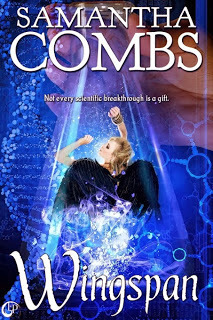
Chessa Dawning never thought she’d be the kind of girl who’d be on the run. Yet, here she was, having left the only home she’s ever known, staying two steps ahead of the men chasing her and falling for a resourceful ex-criminal with colorful friends. And that was just this week.
Most of the time, Charlotte Lake can’t believe her life. The reluctant leader of a rebel faction called the Ginger Nation, Charlie’s days are filled with planning surveillance, rescuing detainees, and exposing government conspiracy. Surrounded by loyal friends and soldiers, she knows she can never reveal the true nature of her quest: finding her real father.
When a sudden twist in both their lives brings these two girls together, revelations about their past will make them rethink where they came from, and define their future in ways they never could have imagined. Not every scientific breakthrough is a gift.
So, I'd love to unveil the beautiful cover here, and entice you with both it and the blurb. Look for Wingspan, coming early December, from esKape Press!

Chessa Dawning never thought she’d be the kind of girl who’d be on the run. Yet, here she was, having left the only home she’s ever known, staying two steps ahead of the men chasing her and falling for a resourceful ex-criminal with colorful friends. And that was just this week.
Most of the time, Charlotte Lake can’t believe her life. The reluctant leader of a rebel faction called the Ginger Nation, Charlie’s days are filled with planning surveillance, rescuing detainees, and exposing government conspiracy. Surrounded by loyal friends and soldiers, she knows she can never reveal the true nature of her quest: finding her real father.
When a sudden twist in both their lives brings these two girls together, revelations about their past will make them rethink where they came from, and define their future in ways they never could have imagined. Not every scientific breakthrough is a gift.
Published on November 25, 2013 21:01
November 9, 2013
The Writer's Alphabet - Y is for Young Adult
This is a timely post since I was just conversing on facebook with someone on this very topic. I started my writing and publishing career with the young adult genre, so it is close to my heart. Over two years ago, I wrote a post on writing YA and I want to share it here today. If I have missed anything, I'd love you to let me know. Thanks and enjoy!
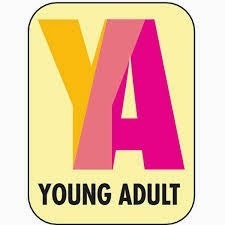 Remember at all times that writing for teens doesn't mean write as though they are stupid. They aren't. In most cases, they are highly intelligent kids, learning about themselves and the world around them, and feeling their way through some of the most enlightening period of their lives. Respect that.Don't trivialize what they are going through. If your think the scene you wrote sounds like a bad after-school special, it probably is. Treat your characters with dignity, no matter what you have them going through.Don't think the lingo and terminology from YOUR youth will still play today. It won't. At the risk of aging me, the Valley-girl crap is O.U.T. Your readers will realize it almost on the first page if you try and fake it. If you intend to write for a specific age group, you have to spend time with them. Join a library group and read to them, volunteer at a school, or just go hang out at the beach. But do it A LOT. One hour at the mall won't do it. Teens have a whole different language and it will take time and dedication to master it. There is no Rosetta Stone for teenspeak.Understand a teen's attention span is about the same to us as our life is to the life of the common housefly. SHORT. You have to capture it on the first page or they toss the book/ipad/kindle aside and grab a DS/Wii/PSP instead. There is no world-building/character-study/working-up-to-it-ness allowed in a middle-grade or young, young-adult book. You have to slam them into the action IMMEDIATELY and keep them there for the whole first chapter. They have to be asking questions at the end of the first paragraph and wanting answers or you already lost them.Covers are EVERYTHING. Splashy, gaudy, dripping with color, or with a teen just like them on the cover and they will buy it every time. Think of every Sarah Dessen book you ever saw. What's on the cover? Something that relates to a teen-aged girl, right? Look at her latest one....back view of low-rise jeans, bottoms covering the feet, hands stuffed in the back pocket in the classic "What-EVER." pose. That cover SOLD that book. Plus her name of course....synonymous with teen angst and empathy.Here's the plus side: If you get all that right, teens practically DEMAND books they love get
Remember at all times that writing for teens doesn't mean write as though they are stupid. They aren't. In most cases, they are highly intelligent kids, learning about themselves and the world around them, and feeling their way through some of the most enlightening period of their lives. Respect that.Don't trivialize what they are going through. If your think the scene you wrote sounds like a bad after-school special, it probably is. Treat your characters with dignity, no matter what you have them going through.Don't think the lingo and terminology from YOUR youth will still play today. It won't. At the risk of aging me, the Valley-girl crap is O.U.T. Your readers will realize it almost on the first page if you try and fake it. If you intend to write for a specific age group, you have to spend time with them. Join a library group and read to them, volunteer at a school, or just go hang out at the beach. But do it A LOT. One hour at the mall won't do it. Teens have a whole different language and it will take time and dedication to master it. There is no Rosetta Stone for teenspeak.Understand a teen's attention span is about the same to us as our life is to the life of the common housefly. SHORT. You have to capture it on the first page or they toss the book/ipad/kindle aside and grab a DS/Wii/PSP instead. There is no world-building/character-study/working-up-to-it-ness allowed in a middle-grade or young, young-adult book. You have to slam them into the action IMMEDIATELY and keep them there for the whole first chapter. They have to be asking questions at the end of the first paragraph and wanting answers or you already lost them.Covers are EVERYTHING. Splashy, gaudy, dripping with color, or with a teen just like them on the cover and they will buy it every time. Think of every Sarah Dessen book you ever saw. What's on the cover? Something that relates to a teen-aged girl, right? Look at her latest one....back view of low-rise jeans, bottoms covering the feet, hands stuffed in the back pocket in the classic "What-EVER." pose. That cover SOLD that book. Plus her name of course....synonymous with teen angst and empathy.Here's the plus side: If you get all that right, teens practically DEMAND books they love get
 made into movies. They buy and buy and buy until agents and movie producers sit up and take notice and before you know it Mandy Moore and KStew and Emma Stone are lining up to play your angsty teenaged heroine in a movie based on your book! (So I dream. We all do. Whatever. Move on.) All I'm saying is everyone thinks it's so easy to write YA and I just want you to know, it's not. Just remember, as complicated as you were when you were a young adult, consider putting all THAT done on paper. Right? I rest my case.
made into movies. They buy and buy and buy until agents and movie producers sit up and take notice and before you know it Mandy Moore and KStew and Emma Stone are lining up to play your angsty teenaged heroine in a movie based on your book! (So I dream. We all do. Whatever. Move on.) All I'm saying is everyone thinks it's so easy to write YA and I just want you to know, it's not. Just remember, as complicated as you were when you were a young adult, consider putting all THAT done on paper. Right? I rest my case.
 Remember at all times that writing for teens doesn't mean write as though they are stupid. They aren't. In most cases, they are highly intelligent kids, learning about themselves and the world around them, and feeling their way through some of the most enlightening period of their lives. Respect that.Don't trivialize what they are going through. If your think the scene you wrote sounds like a bad after-school special, it probably is. Treat your characters with dignity, no matter what you have them going through.Don't think the lingo and terminology from YOUR youth will still play today. It won't. At the risk of aging me, the Valley-girl crap is O.U.T. Your readers will realize it almost on the first page if you try and fake it. If you intend to write for a specific age group, you have to spend time with them. Join a library group and read to them, volunteer at a school, or just go hang out at the beach. But do it A LOT. One hour at the mall won't do it. Teens have a whole different language and it will take time and dedication to master it. There is no Rosetta Stone for teenspeak.Understand a teen's attention span is about the same to us as our life is to the life of the common housefly. SHORT. You have to capture it on the first page or they toss the book/ipad/kindle aside and grab a DS/Wii/PSP instead. There is no world-building/character-study/working-up-to-it-ness allowed in a middle-grade or young, young-adult book. You have to slam them into the action IMMEDIATELY and keep them there for the whole first chapter. They have to be asking questions at the end of the first paragraph and wanting answers or you already lost them.Covers are EVERYTHING. Splashy, gaudy, dripping with color, or with a teen just like them on the cover and they will buy it every time. Think of every Sarah Dessen book you ever saw. What's on the cover? Something that relates to a teen-aged girl, right? Look at her latest one....back view of low-rise jeans, bottoms covering the feet, hands stuffed in the back pocket in the classic "What-EVER." pose. That cover SOLD that book. Plus her name of course....synonymous with teen angst and empathy.Here's the plus side: If you get all that right, teens practically DEMAND books they love get
Remember at all times that writing for teens doesn't mean write as though they are stupid. They aren't. In most cases, they are highly intelligent kids, learning about themselves and the world around them, and feeling their way through some of the most enlightening period of their lives. Respect that.Don't trivialize what they are going through. If your think the scene you wrote sounds like a bad after-school special, it probably is. Treat your characters with dignity, no matter what you have them going through.Don't think the lingo and terminology from YOUR youth will still play today. It won't. At the risk of aging me, the Valley-girl crap is O.U.T. Your readers will realize it almost on the first page if you try and fake it. If you intend to write for a specific age group, you have to spend time with them. Join a library group and read to them, volunteer at a school, or just go hang out at the beach. But do it A LOT. One hour at the mall won't do it. Teens have a whole different language and it will take time and dedication to master it. There is no Rosetta Stone for teenspeak.Understand a teen's attention span is about the same to us as our life is to the life of the common housefly. SHORT. You have to capture it on the first page or they toss the book/ipad/kindle aside and grab a DS/Wii/PSP instead. There is no world-building/character-study/working-up-to-it-ness allowed in a middle-grade or young, young-adult book. You have to slam them into the action IMMEDIATELY and keep them there for the whole first chapter. They have to be asking questions at the end of the first paragraph and wanting answers or you already lost them.Covers are EVERYTHING. Splashy, gaudy, dripping with color, or with a teen just like them on the cover and they will buy it every time. Think of every Sarah Dessen book you ever saw. What's on the cover? Something that relates to a teen-aged girl, right? Look at her latest one....back view of low-rise jeans, bottoms covering the feet, hands stuffed in the back pocket in the classic "What-EVER." pose. That cover SOLD that book. Plus her name of course....synonymous with teen angst and empathy.Here's the plus side: If you get all that right, teens practically DEMAND books they love get
 made into movies. They buy and buy and buy until agents and movie producers sit up and take notice and before you know it Mandy Moore and KStew and Emma Stone are lining up to play your angsty teenaged heroine in a movie based on your book! (So I dream. We all do. Whatever. Move on.) All I'm saying is everyone thinks it's so easy to write YA and I just want you to know, it's not. Just remember, as complicated as you were when you were a young adult, consider putting all THAT done on paper. Right? I rest my case.
made into movies. They buy and buy and buy until agents and movie producers sit up and take notice and before you know it Mandy Moore and KStew and Emma Stone are lining up to play your angsty teenaged heroine in a movie based on your book! (So I dream. We all do. Whatever. Move on.) All I'm saying is everyone thinks it's so easy to write YA and I just want you to know, it's not. Just remember, as complicated as you were when you were a young adult, consider putting all THAT done on paper. Right? I rest my case.
Published on November 09, 2013 05:00
November 7, 2013
The Writer's Alphabet - X is for Exit
Okay, I know I am cheating with this letter, but the topic is perfect for the end of the alphabet. I want to talk about the end of your story. The exit. From my own experience, I am all too excited to get to the end of the book I am writing. So excited, in fact, that I have to stop myself from steamrolling down to the last word. I have OFTEN rewritten the ending the next day or next week that in my overwhelming joy I pounded out the day or week before. With unbridled restraint.
 Possibly you are thinking this might go against the advice I always give that the first draft ought to be written all the way through without stopping. I'm not. I still write my novels without editing along the way, still with wild abandon. But, the fact remains and must be said: I stop and consider thoughtfully the ending. Of a novel, a novella, a short story. I have to. Because as far as I am concerned, it's the most important part. You know, next to the start and the middle. :-)
Possibly you are thinking this might go against the advice I always give that the first draft ought to be written all the way through without stopping. I'm not. I still write my novels without editing along the way, still with wild abandon. But, the fact remains and must be said: I stop and consider thoughtfully the ending. Of a novel, a novella, a short story. I have to. Because as far as I am concerned, it's the most important part. You know, next to the start and the middle. :-)
Since I don't write series, as a general rule, I have this unhealthy need to wrap all loose ends up at the end of a tale. So much so that I often retrace my literal steps to make sure no stone goes unturned. And here again, lies the rub. You, of course, know I have written a series. I swear it was quite by accident and I pride myself with the knowledge that even though the books (SPELLBOUND and EVERSPELL) are in a series, they can be read and enjoyed as stand-alones. But, I still need to tidy everything up and wrap it in a great big bow.

And that is why X is for exit. As a writer, we have a dual intention. We want to write an exit befitting the genre and the characters. And even if it ends, we want there to be just the tiniest hint we might revisit their worlds. If the readers like them enough, they will practically demand it.
 Possibly you are thinking this might go against the advice I always give that the first draft ought to be written all the way through without stopping. I'm not. I still write my novels without editing along the way, still with wild abandon. But, the fact remains and must be said: I stop and consider thoughtfully the ending. Of a novel, a novella, a short story. I have to. Because as far as I am concerned, it's the most important part. You know, next to the start and the middle. :-)
Possibly you are thinking this might go against the advice I always give that the first draft ought to be written all the way through without stopping. I'm not. I still write my novels without editing along the way, still with wild abandon. But, the fact remains and must be said: I stop and consider thoughtfully the ending. Of a novel, a novella, a short story. I have to. Because as far as I am concerned, it's the most important part. You know, next to the start and the middle. :-)Since I don't write series, as a general rule, I have this unhealthy need to wrap all loose ends up at the end of a tale. So much so that I often retrace my literal steps to make sure no stone goes unturned. And here again, lies the rub. You, of course, know I have written a series. I swear it was quite by accident and I pride myself with the knowledge that even though the books (SPELLBOUND and EVERSPELL) are in a series, they can be read and enjoyed as stand-alones. But, I still need to tidy everything up and wrap it in a great big bow.

And that is why X is for exit. As a writer, we have a dual intention. We want to write an exit befitting the genre and the characters. And even if it ends, we want there to be just the tiniest hint we might revisit their worlds. If the readers like them enough, they will practically demand it.
Published on November 07, 2013 23:26
November 3, 2013
The Writer's Alphabet - W is for Word Echo
When I am writing, as I have mentioned before, I use words over. And over. And over. My editor has mentioned this to me as well. She has asked me not to do this in my writing.
See what I did there? I made a terrible, but pointed demonstration of a word echo. In this case, I used the word mentioned and the word writing in two different places in the same thought line. This doesn't mean you can't use the word "said" one time in a 300-page manuscript. This means that the word should not appear incessantly in one scene, or one paragraph, or even in one chapter.
 If you think you have a problem with word echoing, try this exercise: take the word you think you have an unhealthy addiction to, and plug it into the find and replace button on the editing tools for your Word document. I have done this and continue to do this every time I finish a manuscript. It is enlightening and astonishing at the same time. My word nemesis, ask my editor, is the word "clearly". I am like a whore for this word, using it willingly and wantonly in every novel or short story. last time I checked, I started with 62 times. Seriously. After some hard editing, I have reduced it down to 8 times. This is a MAJOR achievement for me. Again, ask my editor. (Sorry Kay)
If you think you have a problem with word echoing, try this exercise: take the word you think you have an unhealthy addiction to, and plug it into the find and replace button on the editing tools for your Word document. I have done this and continue to do this every time I finish a manuscript. It is enlightening and astonishing at the same time. My word nemesis, ask my editor, is the word "clearly". I am like a whore for this word, using it willingly and wantonly in every novel or short story. last time I checked, I started with 62 times. Seriously. After some hard editing, I have reduced it down to 8 times. This is a MAJOR achievement for me. Again, ask my editor. (Sorry Kay)
Another trick I use is to take the offending paragraph or chapter and read it out loud to myself. I find that often my brilliant mind will insert the word that should have been there and make it that easy to remove the word crutch. That's what I call the knee-jerk reaction word, mine of course being "clearly".
Try these out and see if they don't help. The best news is that when you do them several times, soon they will become old hat and you'll find you don't even need them! I hope to be there some day. Until then, these tricks make me, force me actually, to be a better writer. That's what we all want, right?
 And here is a fun fact: the word echo comes from Greek mythology. Echo was a nymph whose job it was to talk incessantly to Hera, Zeus' wife, so she would be distracted when Zeus was having affairs. When Hera found out, she was so angry that she cursed Echo to only be able to repeat what someone else has said, thus the word "Echo".
And here is a fun fact: the word echo comes from Greek mythology. Echo was a nymph whose job it was to talk incessantly to Hera, Zeus' wife, so she would be distracted when Zeus was having affairs. When Hera found out, she was so angry that she cursed Echo to only be able to repeat what someone else has said, thus the word "Echo".
See what I did there? I made a terrible, but pointed demonstration of a word echo. In this case, I used the word mentioned and the word writing in two different places in the same thought line. This doesn't mean you can't use the word "said" one time in a 300-page manuscript. This means that the word should not appear incessantly in one scene, or one paragraph, or even in one chapter.
 If you think you have a problem with word echoing, try this exercise: take the word you think you have an unhealthy addiction to, and plug it into the find and replace button on the editing tools for your Word document. I have done this and continue to do this every time I finish a manuscript. It is enlightening and astonishing at the same time. My word nemesis, ask my editor, is the word "clearly". I am like a whore for this word, using it willingly and wantonly in every novel or short story. last time I checked, I started with 62 times. Seriously. After some hard editing, I have reduced it down to 8 times. This is a MAJOR achievement for me. Again, ask my editor. (Sorry Kay)
If you think you have a problem with word echoing, try this exercise: take the word you think you have an unhealthy addiction to, and plug it into the find and replace button on the editing tools for your Word document. I have done this and continue to do this every time I finish a manuscript. It is enlightening and astonishing at the same time. My word nemesis, ask my editor, is the word "clearly". I am like a whore for this word, using it willingly and wantonly in every novel or short story. last time I checked, I started with 62 times. Seriously. After some hard editing, I have reduced it down to 8 times. This is a MAJOR achievement for me. Again, ask my editor. (Sorry Kay)Another trick I use is to take the offending paragraph or chapter and read it out loud to myself. I find that often my brilliant mind will insert the word that should have been there and make it that easy to remove the word crutch. That's what I call the knee-jerk reaction word, mine of course being "clearly".
Try these out and see if they don't help. The best news is that when you do them several times, soon they will become old hat and you'll find you don't even need them! I hope to be there some day. Until then, these tricks make me, force me actually, to be a better writer. That's what we all want, right?
 And here is a fun fact: the word echo comes from Greek mythology. Echo was a nymph whose job it was to talk incessantly to Hera, Zeus' wife, so she would be distracted when Zeus was having affairs. When Hera found out, she was so angry that she cursed Echo to only be able to repeat what someone else has said, thus the word "Echo".
And here is a fun fact: the word echo comes from Greek mythology. Echo was a nymph whose job it was to talk incessantly to Hera, Zeus' wife, so she would be distracted when Zeus was having affairs. When Hera found out, she was so angry that she cursed Echo to only be able to repeat what someone else has said, thus the word "Echo".
Published on November 03, 2013 05:00
November 1, 2013
The Writer's Alphabet - V is for Vanity Press
Once considered a bad word in the publishing industry, vanity presses have undergone somewhat of a makeover in recent years. As the Big Six became the Big Five, and the Big Five and Amazon (bigger than the Big Five even when they were still the Big Six) embraced the technological baby called the e-book, even vanity presses got, well, good press.
Vanity press is technically defined as a publisher who requires an author to pay them to publish their books. Wait. Doesn't that sound like, um, Smashwords, and Lulu and all those other print-on-demand companies? Well, no. Liken this to a restaurant. (Maybe I'm hungry?) Dine-in five star establishments feed you first, then you pay after, pricing based on the quality of the product. Other places, with less overhead and little fanfare, require you to pay first, then you get to eat. That sounds a little more like a vanity press. But, there are still grave issues associated with a vanity press and this is why I don't like them.
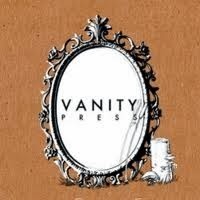 They are not selective. They take anyone who has the money to pay them and the dream to see their words in print. There is no editing, no quality control, and as a result, you see a finished product with little quality at all.the term itself indicates an author who is publishing out of their own vanity and therefore the work has no commercial valuePresses that cater to self-publishers do little to no marketing. The author is basically left on their own.the subject of the vanity published novel generally tend to have a limited audience.publication from a vanity press is typically not seen as conferring the same recognition or prestige as commercial publication.Now, this is not to say that you should only go with the Big Five and that's it. On the contrary, as I blogged about in the letter I, Indie Houses are amazing. I have the great fortune to be associated with three well-known and well-regarded indie houses: Astraea Press, Musa Publishing, and Secret Cravings Publishing. I am about to be introducing my tenth novel, WINGSPAN, through a fourth house, Eskape Press. Additionally, self-publishing by an author is another route I recommend and have actually gone with three of my horror short story collections.
They are not selective. They take anyone who has the money to pay them and the dream to see their words in print. There is no editing, no quality control, and as a result, you see a finished product with little quality at all.the term itself indicates an author who is publishing out of their own vanity and therefore the work has no commercial valuePresses that cater to self-publishers do little to no marketing. The author is basically left on their own.the subject of the vanity published novel generally tend to have a limited audience.publication from a vanity press is typically not seen as conferring the same recognition or prestige as commercial publication.Now, this is not to say that you should only go with the Big Five and that's it. On the contrary, as I blogged about in the letter I, Indie Houses are amazing. I have the great fortune to be associated with three well-known and well-regarded indie houses: Astraea Press, Musa Publishing, and Secret Cravings Publishing. I am about to be introducing my tenth novel, WINGSPAN, through a fourth house, Eskape Press. Additionally, self-publishing by an author is another route I recommend and have actually gone with three of my horror short story collections.
 Which publishing journey you choose to take, either independently, with a large house, or with an indie, the choice is personal. Make the one that best suits you and your individual needs. Do your research and make sure the house id reputable and credible. I have a favorite motto: Write, publish, and be informed! And good luck!
Which publishing journey you choose to take, either independently, with a large house, or with an indie, the choice is personal. Make the one that best suits you and your individual needs. Do your research and make sure the house id reputable and credible. I have a favorite motto: Write, publish, and be informed! And good luck!
Vanity press is technically defined as a publisher who requires an author to pay them to publish their books. Wait. Doesn't that sound like, um, Smashwords, and Lulu and all those other print-on-demand companies? Well, no. Liken this to a restaurant. (Maybe I'm hungry?) Dine-in five star establishments feed you first, then you pay after, pricing based on the quality of the product. Other places, with less overhead and little fanfare, require you to pay first, then you get to eat. That sounds a little more like a vanity press. But, there are still grave issues associated with a vanity press and this is why I don't like them.
 They are not selective. They take anyone who has the money to pay them and the dream to see their words in print. There is no editing, no quality control, and as a result, you see a finished product with little quality at all.the term itself indicates an author who is publishing out of their own vanity and therefore the work has no commercial valuePresses that cater to self-publishers do little to no marketing. The author is basically left on their own.the subject of the vanity published novel generally tend to have a limited audience.publication from a vanity press is typically not seen as conferring the same recognition or prestige as commercial publication.Now, this is not to say that you should only go with the Big Five and that's it. On the contrary, as I blogged about in the letter I, Indie Houses are amazing. I have the great fortune to be associated with three well-known and well-regarded indie houses: Astraea Press, Musa Publishing, and Secret Cravings Publishing. I am about to be introducing my tenth novel, WINGSPAN, through a fourth house, Eskape Press. Additionally, self-publishing by an author is another route I recommend and have actually gone with three of my horror short story collections.
They are not selective. They take anyone who has the money to pay them and the dream to see their words in print. There is no editing, no quality control, and as a result, you see a finished product with little quality at all.the term itself indicates an author who is publishing out of their own vanity and therefore the work has no commercial valuePresses that cater to self-publishers do little to no marketing. The author is basically left on their own.the subject of the vanity published novel generally tend to have a limited audience.publication from a vanity press is typically not seen as conferring the same recognition or prestige as commercial publication.Now, this is not to say that you should only go with the Big Five and that's it. On the contrary, as I blogged about in the letter I, Indie Houses are amazing. I have the great fortune to be associated with three well-known and well-regarded indie houses: Astraea Press, Musa Publishing, and Secret Cravings Publishing. I am about to be introducing my tenth novel, WINGSPAN, through a fourth house, Eskape Press. Additionally, self-publishing by an author is another route I recommend and have actually gone with three of my horror short story collections. Which publishing journey you choose to take, either independently, with a large house, or with an indie, the choice is personal. Make the one that best suits you and your individual needs. Do your research and make sure the house id reputable and credible. I have a favorite motto: Write, publish, and be informed! And good luck!
Which publishing journey you choose to take, either independently, with a large house, or with an indie, the choice is personal. Make the one that best suits you and your individual needs. Do your research and make sure the house id reputable and credible. I have a favorite motto: Write, publish, and be informed! And good luck!
Published on November 01, 2013 05:00
October 30, 2013
The Writer's Alphabet - U is for Utopia
As genres for writers and readers become more and more defined (ex: New Adult deriving from Young Adult, Erotic Horror deriving from Horror) fantasy fiction was bound to develop into several different sub-genres. And that is what has happened. Today you can find dystopic fiction, steampunk, Ectopian and Utopian fiction. I relied heavily on internet information regarding these genres because admittedly, I do not write in any of them. I welcome any and all corrections and input.
 UTOPIAN FICTION:The definition of utopian fiction is this: a novel that presents an ideal society where all social problems like crime or poverty, have been eliminated. You have certainly read many books with this theme. My favorites are
George Orwell's 1984
,
Farenheit 454
,
The Handmaid's Tale
, and Aldous Huxley's
Brave New World
. More recent examples also include Matched by Ally Condie and the Hunger Games trilogy.
UTOPIAN FICTION:The definition of utopian fiction is this: a novel that presents an ideal society where all social problems like crime or poverty, have been eliminated. You have certainly read many books with this theme. My favorites are
George Orwell's 1984
,
Farenheit 454
,
The Handmaid's Tale
, and Aldous Huxley's
Brave New World
. More recent examples also include Matched by Ally Condie and the Hunger Games trilogy.
 DYSTOPIAN FICTION:So, as utopian fiction concerns the creation of an ideal society, dystopian fiction is the complete opposite: the creation of an utterly horrible or degraded society that is generally headed to its own catastrophic end. Examples include
Cloud Atlas
, and the
Divergent Series
.
DYSTOPIAN FICTION:So, as utopian fiction concerns the creation of an ideal society, dystopian fiction is the complete opposite: the creation of an utterly horrible or degraded society that is generally headed to its own catastrophic end. Examples include
Cloud Atlas
, and the
Divergent Series
.
 ECTOPIAN FICTION:Yet another off-shoot, called Ectopian fiction. This is where the author creates either a utopian world or dystopian world which revolves around environmental conservation or destruction. Fun examples of this would be the movies
Avatar, Wall-E,
and
Robo-Cop
. Ectopian fiction is also referred to as Cli-fi, due to it's heavy reliance as climate as nearly the star.
ECTOPIAN FICTION:Yet another off-shoot, called Ectopian fiction. This is where the author creates either a utopian world or dystopian world which revolves around environmental conservation or destruction. Fun examples of this would be the movies
Avatar, Wall-E,
and
Robo-Cop
. Ectopian fiction is also referred to as Cli-fi, due to it's heavy reliance as climate as nearly the star.
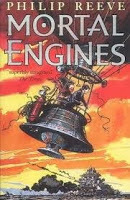 STEAMPUNK FICTION:This is a sub-genre of Science Fiction that typically features steam-powered machinery especially in a setting inspired by industrialiezed Western Civilization in the nineteeth century. Steampunk works are set in either an alternative history of the Victorian era or a post-apocalyptic future in which steam-powered machinery has regained mainstream use. Well-known authors in this genre include Phillip Reeve's quartet
Mortal Engines
, and Scott Westerfeld's
Leviathon
trilogy
STEAMPUNK FICTION:This is a sub-genre of Science Fiction that typically features steam-powered machinery especially in a setting inspired by industrialiezed Western Civilization in the nineteeth century. Steampunk works are set in either an alternative history of the Victorian era or a post-apocalyptic future in which steam-powered machinery has regained mainstream use. Well-known authors in this genre include Phillip Reeve's quartet
Mortal Engines
, and Scott Westerfeld's
Leviathon
trilogy
 UTOPIAN FICTION:The definition of utopian fiction is this: a novel that presents an ideal society where all social problems like crime or poverty, have been eliminated. You have certainly read many books with this theme. My favorites are
George Orwell's 1984
,
Farenheit 454
,
The Handmaid's Tale
, and Aldous Huxley's
Brave New World
. More recent examples also include Matched by Ally Condie and the Hunger Games trilogy.
UTOPIAN FICTION:The definition of utopian fiction is this: a novel that presents an ideal society where all social problems like crime or poverty, have been eliminated. You have certainly read many books with this theme. My favorites are
George Orwell's 1984
,
Farenheit 454
,
The Handmaid's Tale
, and Aldous Huxley's
Brave New World
. More recent examples also include Matched by Ally Condie and the Hunger Games trilogy. DYSTOPIAN FICTION:So, as utopian fiction concerns the creation of an ideal society, dystopian fiction is the complete opposite: the creation of an utterly horrible or degraded society that is generally headed to its own catastrophic end. Examples include
Cloud Atlas
, and the
Divergent Series
.
DYSTOPIAN FICTION:So, as utopian fiction concerns the creation of an ideal society, dystopian fiction is the complete opposite: the creation of an utterly horrible or degraded society that is generally headed to its own catastrophic end. Examples include
Cloud Atlas
, and the
Divergent Series
. ECTOPIAN FICTION:Yet another off-shoot, called Ectopian fiction. This is where the author creates either a utopian world or dystopian world which revolves around environmental conservation or destruction. Fun examples of this would be the movies
Avatar, Wall-E,
and
Robo-Cop
. Ectopian fiction is also referred to as Cli-fi, due to it's heavy reliance as climate as nearly the star.
ECTOPIAN FICTION:Yet another off-shoot, called Ectopian fiction. This is where the author creates either a utopian world or dystopian world which revolves around environmental conservation or destruction. Fun examples of this would be the movies
Avatar, Wall-E,
and
Robo-Cop
. Ectopian fiction is also referred to as Cli-fi, due to it's heavy reliance as climate as nearly the star. STEAMPUNK FICTION:This is a sub-genre of Science Fiction that typically features steam-powered machinery especially in a setting inspired by industrialiezed Western Civilization in the nineteeth century. Steampunk works are set in either an alternative history of the Victorian era or a post-apocalyptic future in which steam-powered machinery has regained mainstream use. Well-known authors in this genre include Phillip Reeve's quartet
Mortal Engines
, and Scott Westerfeld's
Leviathon
trilogy
STEAMPUNK FICTION:This is a sub-genre of Science Fiction that typically features steam-powered machinery especially in a setting inspired by industrialiezed Western Civilization in the nineteeth century. Steampunk works are set in either an alternative history of the Victorian era or a post-apocalyptic future in which steam-powered machinery has regained mainstream use. Well-known authors in this genre include Phillip Reeve's quartet
Mortal Engines
, and Scott Westerfeld's
Leviathon
trilogy
Published on October 30, 2013 05:00
October 28, 2013
The Writer's Alphabet - T is for Tense
No, I don't mean how your shoulders get when the words won't come and your characters keep misbehaving. No, this is different. Tense refers to the time your story takes place, past, present, or future.
 Determining tense is a decision you need to make even before you write the story. It has nothing to do with if you are writing a time-travel novel, so don't freak out! Mostly, you will need to decide if your character is experiencing the actions at the moment, or the story relates them as they happened.
Determining tense is a decision you need to make even before you write the story. It has nothing to do with if you are writing a time-travel novel, so don't freak out! Mostly, you will need to decide if your character is experiencing the actions at the moment, or the story relates them as they happened.
Interestingly, present tense is not a favorite for many. There are readers who will refuse to read a story in present tense. I am also aware of agents who will not accept one written in present tense, and publishers have been known to make it a guideline that they will not accept a manuscript not written in past tense.
Personally speaking, I find it difficult to impossible to write in present tense. To me, the present tense sounds artificial and awkward. However, it is a matter of intensely personal opinion. If you do choose present tense, there are a couple of general rules for commercially accepted manuscripts.
Present tense = first person. I honestly can't see it any other way, but nothing surprises me anymore.Past tense = third person. Even if you are writing as the first person, your character is still relating evens that have already happened, so it would still be past tense.Present tense works better in short stories or flash fiction. Writing in the present makes the action more immediate and you want that in a short story. You have limited space to convey angst, emotion, etc., and writing in the present tense makes the action seem more, well, present.Longer stories are better in past tense. But, consider this: you could write in the present tense and still need to weave flashbacks in your story. So, you are back to past tense anyway.Present tense also sometimes strings together monologues, the inner thoughts of your character. For a reader, that can sometimes be tedious. Present tense can be as hard on the reader as the author!
The most important thing to remember is consistency. Whatever tense you choose, keep it constant throughout. The reader will absolutely NAIL you for it if you don't.
 Determining tense is a decision you need to make even before you write the story. It has nothing to do with if you are writing a time-travel novel, so don't freak out! Mostly, you will need to decide if your character is experiencing the actions at the moment, or the story relates them as they happened.
Determining tense is a decision you need to make even before you write the story. It has nothing to do with if you are writing a time-travel novel, so don't freak out! Mostly, you will need to decide if your character is experiencing the actions at the moment, or the story relates them as they happened.Interestingly, present tense is not a favorite for many. There are readers who will refuse to read a story in present tense. I am also aware of agents who will not accept one written in present tense, and publishers have been known to make it a guideline that they will not accept a manuscript not written in past tense.
Personally speaking, I find it difficult to impossible to write in present tense. To me, the present tense sounds artificial and awkward. However, it is a matter of intensely personal opinion. If you do choose present tense, there are a couple of general rules for commercially accepted manuscripts.
Present tense = first person. I honestly can't see it any other way, but nothing surprises me anymore.Past tense = third person. Even if you are writing as the first person, your character is still relating evens that have already happened, so it would still be past tense.Present tense works better in short stories or flash fiction. Writing in the present makes the action more immediate and you want that in a short story. You have limited space to convey angst, emotion, etc., and writing in the present tense makes the action seem more, well, present.Longer stories are better in past tense. But, consider this: you could write in the present tense and still need to weave flashbacks in your story. So, you are back to past tense anyway.Present tense also sometimes strings together monologues, the inner thoughts of your character. For a reader, that can sometimes be tedious. Present tense can be as hard on the reader as the author!

The most important thing to remember is consistency. Whatever tense you choose, keep it constant throughout. The reader will absolutely NAIL you for it if you don't.
Published on October 28, 2013 05:00
October 27, 2013
The Writer's Alphabet - S is for Show, Don't Tell
There are several things I do wrong every time I write a novel, a short story, or, let's face it, a paragraph. I use the word clearly uncomfortably often, I use way too many asterisks in the middle of the chapter, and I struggle with my letter for the day. S is for show, don't tell.
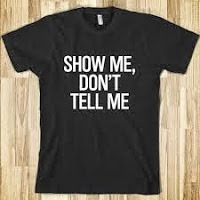
It took me forever to realize what I was doing. Longer to CHANGE what I was doing when prompted by my editor. And I still have trouble every day RECOGNIZING what I am doing. (Again, a serious shout-out to my editor, who puts up with my crap and rubs my nose in it like a dog that crapped on the carpet.) The good news for you, is I can totally DESCRIBE it.
Show, don't tell means exactly what it says. In your novel, you should not say someone got mad. No, you need to write them stomping across the floor and slamming the screen door behind them. See what I did there? I SHOWED you anger instead of saying it. Making the reader see what you are talking about gives them vision into your vision, and gives them a way to care about your character. Easy, right. Yeah, I still didn't get it. Finally, I found a way to keep it in my head at all times. The easiest way for me to remember it is this: If it sounds like you are reporting the scene, as though on the news, you aren't showing. The telling is all about who/what/when/where/how and showing is the emotional aspect of it. Look, here are a couple of examples.
Tell: Her face registered disapproval.
Show: She paused, her eyes narrowing, and pursed her lips in distaste.
Tell: He quickly walked across the floor toward her.
Show: Closing the distance between them, he strode purposefully, long legs pumping.
Tell: She barely smiled.
Show: The corners of her lips turned up, so slightly he wasn't sure if he had made her happy or not.
 Some other tips: your action words have to be lively to be showing, not telling. Don't use the words "are", "is" "has" or "have". Replace them with an action word that actually is a movement.
Some other tips: your action words have to be lively to be showing, not telling. Don't use the words "are", "is" "has" or "have". Replace them with an action word that actually is a movement.
"Aged" "stretched" "resided" "argues". These words all imply action, instead of being passive.
Also, use all your five senses in your descriptors. Instead of REPORTING how she looked, tell us how she smelled, how soft her skin was, how her laughter was like chimes.
Use compelling adjectives. Words like "pretty", "cool", "good" "bad" should be replaced with stunning, quirky, grand, or hateful. See? Way more interesting, thought-provoking, right?
Can you think of some more great examples? Share them here, most of the readers of the bloggy enjoy the tips!

It took me forever to realize what I was doing. Longer to CHANGE what I was doing when prompted by my editor. And I still have trouble every day RECOGNIZING what I am doing. (Again, a serious shout-out to my editor, who puts up with my crap and rubs my nose in it like a dog that crapped on the carpet.) The good news for you, is I can totally DESCRIBE it.
Show, don't tell means exactly what it says. In your novel, you should not say someone got mad. No, you need to write them stomping across the floor and slamming the screen door behind them. See what I did there? I SHOWED you anger instead of saying it. Making the reader see what you are talking about gives them vision into your vision, and gives them a way to care about your character. Easy, right. Yeah, I still didn't get it. Finally, I found a way to keep it in my head at all times. The easiest way for me to remember it is this: If it sounds like you are reporting the scene, as though on the news, you aren't showing. The telling is all about who/what/when/where/how and showing is the emotional aspect of it. Look, here are a couple of examples.
Tell: Her face registered disapproval.
Show: She paused, her eyes narrowing, and pursed her lips in distaste.
Tell: He quickly walked across the floor toward her.
Show: Closing the distance between them, he strode purposefully, long legs pumping.
Tell: She barely smiled.
Show: The corners of her lips turned up, so slightly he wasn't sure if he had made her happy or not.
 Some other tips: your action words have to be lively to be showing, not telling. Don't use the words "are", "is" "has" or "have". Replace them with an action word that actually is a movement.
Some other tips: your action words have to be lively to be showing, not telling. Don't use the words "are", "is" "has" or "have". Replace them with an action word that actually is a movement."Aged" "stretched" "resided" "argues". These words all imply action, instead of being passive.
Also, use all your five senses in your descriptors. Instead of REPORTING how she looked, tell us how she smelled, how soft her skin was, how her laughter was like chimes.
Use compelling adjectives. Words like "pretty", "cool", "good" "bad" should be replaced with stunning, quirky, grand, or hateful. See? Way more interesting, thought-provoking, right?
Can you think of some more great examples? Share them here, most of the readers of the bloggy enjoy the tips!
Published on October 27, 2013 05:00
October 24, 2013
The Writer's Alphabet - R is for Reviews
Reviews is a sacred topic to an author. To some it might be the difference between making the best-selling list or falling way below the quadruple digits on Amazon. It might also be the thing that makes you a household name with the readers of your genre. See? They are serious things. I don't give them for that reason. I don't think I can be impartial enough. Others are simply AMAZING reviewers and I have had the good fortune to be reviewed by several of the best, in all my genres. But, the whole review issue has come to a head. I wrote a blog topic on this earlier in the year and its a perfect theft for this blog. I learned quite a few things and this is the perfect place to remind you of them.
So, here are the things I learned:
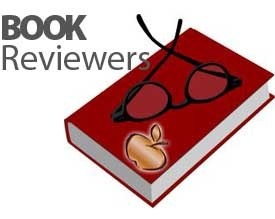 Reviewers read and review books because they love to read. And they love the authors. Of course, I knew this, or at least suspected it, but it was cool to read it from a certified source. Remember, this for the next thing I learned.Reviewers would love to have your book. And anything else you might offer. I used to be embarrassed about asking for reviews, but I have changed my opinion on that now. I'll ask anyone, but I always offer a copy of my book in exchange for an honest review. If I am requesting a review on a book I have in print, I offer that book, signed, as well. And I try to send reviewers signed book marks for their time. Because they spend a truckload of time on reviews. And while I do NOT believe it is ethical to pay for a review, I feel offering my book is the gift I give them for the gift of their review.Reviewers want you to know that it KILLS them to not review your book favorably. If they are reviewing for themselves, most will contact you and explain why they are not posting a review. You should be grateful for that. If they are writing for a site, they have to post a review. If it is not the glowing 5-star you expect, DO NOT RESPOND NEGATIVELY TO THE REVIEW. Swallow your pride and your disgust and use it as learning tool. Most reviewers tend to be stingy with the 5-stars. Expect that. I, personally, am happy with a 3-star and thrilled with a 4-star. My head is not too big to realize there is a thing or two I have yet to learn, and each new book helps me learn it. Think of one hit song wonders, like "My Sharona". That was their 5-star review. And where was their follow-up? Non-existent. My point exactly.Reviewers don't want you to be afraid to ask for a review. Most are elated that their opinion is important to you. Most also would like to know where you want reviews posted. Some authors are no longer requesting reviews be posted to Amazon, afraid of any measure of retribution. But, contrary to popular opinion, they are NOT the only game in town. Authors can have reviews posted on Barnes and Noble, Good reads, Pinterest, publisher's sites, as well as the reviewer and author's own pages.Lastly, if you read and review as well, offer to return the favor. Many reviewers are authors too, and your opinion of their work may be just as important to them as theirs to yours. Give them the opportunity. I am NOT a reviewer, so instead, I offer to host them on my personal bloggy, this actual bloggy, in fact. I've never been turned down. :-)
Reviewers read and review books because they love to read. And they love the authors. Of course, I knew this, or at least suspected it, but it was cool to read it from a certified source. Remember, this for the next thing I learned.Reviewers would love to have your book. And anything else you might offer. I used to be embarrassed about asking for reviews, but I have changed my opinion on that now. I'll ask anyone, but I always offer a copy of my book in exchange for an honest review. If I am requesting a review on a book I have in print, I offer that book, signed, as well. And I try to send reviewers signed book marks for their time. Because they spend a truckload of time on reviews. And while I do NOT believe it is ethical to pay for a review, I feel offering my book is the gift I give them for the gift of their review.Reviewers want you to know that it KILLS them to not review your book favorably. If they are reviewing for themselves, most will contact you and explain why they are not posting a review. You should be grateful for that. If they are writing for a site, they have to post a review. If it is not the glowing 5-star you expect, DO NOT RESPOND NEGATIVELY TO THE REVIEW. Swallow your pride and your disgust and use it as learning tool. Most reviewers tend to be stingy with the 5-stars. Expect that. I, personally, am happy with a 3-star and thrilled with a 4-star. My head is not too big to realize there is a thing or two I have yet to learn, and each new book helps me learn it. Think of one hit song wonders, like "My Sharona". That was their 5-star review. And where was their follow-up? Non-existent. My point exactly.Reviewers don't want you to be afraid to ask for a review. Most are elated that their opinion is important to you. Most also would like to know where you want reviews posted. Some authors are no longer requesting reviews be posted to Amazon, afraid of any measure of retribution. But, contrary to popular opinion, they are NOT the only game in town. Authors can have reviews posted on Barnes and Noble, Good reads, Pinterest, publisher's sites, as well as the reviewer and author's own pages.Lastly, if you read and review as well, offer to return the favor. Many reviewers are authors too, and your opinion of their work may be just as important to them as theirs to yours. Give them the opportunity. I am NOT a reviewer, so instead, I offer to host them on my personal bloggy, this actual bloggy, in fact. I've never been turned down. :-)
So, here are the things I learned:
 Reviewers read and review books because they love to read. And they love the authors. Of course, I knew this, or at least suspected it, but it was cool to read it from a certified source. Remember, this for the next thing I learned.Reviewers would love to have your book. And anything else you might offer. I used to be embarrassed about asking for reviews, but I have changed my opinion on that now. I'll ask anyone, but I always offer a copy of my book in exchange for an honest review. If I am requesting a review on a book I have in print, I offer that book, signed, as well. And I try to send reviewers signed book marks for their time. Because they spend a truckload of time on reviews. And while I do NOT believe it is ethical to pay for a review, I feel offering my book is the gift I give them for the gift of their review.Reviewers want you to know that it KILLS them to not review your book favorably. If they are reviewing for themselves, most will contact you and explain why they are not posting a review. You should be grateful for that. If they are writing for a site, they have to post a review. If it is not the glowing 5-star you expect, DO NOT RESPOND NEGATIVELY TO THE REVIEW. Swallow your pride and your disgust and use it as learning tool. Most reviewers tend to be stingy with the 5-stars. Expect that. I, personally, am happy with a 3-star and thrilled with a 4-star. My head is not too big to realize there is a thing or two I have yet to learn, and each new book helps me learn it. Think of one hit song wonders, like "My Sharona". That was their 5-star review. And where was their follow-up? Non-existent. My point exactly.Reviewers don't want you to be afraid to ask for a review. Most are elated that their opinion is important to you. Most also would like to know where you want reviews posted. Some authors are no longer requesting reviews be posted to Amazon, afraid of any measure of retribution. But, contrary to popular opinion, they are NOT the only game in town. Authors can have reviews posted on Barnes and Noble, Good reads, Pinterest, publisher's sites, as well as the reviewer and author's own pages.Lastly, if you read and review as well, offer to return the favor. Many reviewers are authors too, and your opinion of their work may be just as important to them as theirs to yours. Give them the opportunity. I am NOT a reviewer, so instead, I offer to host them on my personal bloggy, this actual bloggy, in fact. I've never been turned down. :-)
Reviewers read and review books because they love to read. And they love the authors. Of course, I knew this, or at least suspected it, but it was cool to read it from a certified source. Remember, this for the next thing I learned.Reviewers would love to have your book. And anything else you might offer. I used to be embarrassed about asking for reviews, but I have changed my opinion on that now. I'll ask anyone, but I always offer a copy of my book in exchange for an honest review. If I am requesting a review on a book I have in print, I offer that book, signed, as well. And I try to send reviewers signed book marks for their time. Because they spend a truckload of time on reviews. And while I do NOT believe it is ethical to pay for a review, I feel offering my book is the gift I give them for the gift of their review.Reviewers want you to know that it KILLS them to not review your book favorably. If they are reviewing for themselves, most will contact you and explain why they are not posting a review. You should be grateful for that. If they are writing for a site, they have to post a review. If it is not the glowing 5-star you expect, DO NOT RESPOND NEGATIVELY TO THE REVIEW. Swallow your pride and your disgust and use it as learning tool. Most reviewers tend to be stingy with the 5-stars. Expect that. I, personally, am happy with a 3-star and thrilled with a 4-star. My head is not too big to realize there is a thing or two I have yet to learn, and each new book helps me learn it. Think of one hit song wonders, like "My Sharona". That was their 5-star review. And where was their follow-up? Non-existent. My point exactly.Reviewers don't want you to be afraid to ask for a review. Most are elated that their opinion is important to you. Most also would like to know where you want reviews posted. Some authors are no longer requesting reviews be posted to Amazon, afraid of any measure of retribution. But, contrary to popular opinion, they are NOT the only game in town. Authors can have reviews posted on Barnes and Noble, Good reads, Pinterest, publisher's sites, as well as the reviewer and author's own pages.Lastly, if you read and review as well, offer to return the favor. Many reviewers are authors too, and your opinion of their work may be just as important to them as theirs to yours. Give them the opportunity. I am NOT a reviewer, so instead, I offer to host them on my personal bloggy, this actual bloggy, in fact. I've never been turned down. :-)
Published on October 24, 2013 05:00



